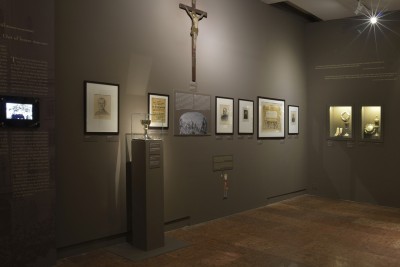- Hitre, tudásra: A piaristák és a magyar művelődés
(Budapesti Történeti Múzeum, Vármúzeum, 2017. november 15.–2018. február 28.)
|
A piaristák tanári léte megkövetelte, hogy nemcsak diákjaikkal, iskolaidőben, hanem azok családjaival is kapcsolatban maradjanak, akár az iskola elvégzése után is. A rend tagjai tehát szorosan együtt éltek az őket körülvevő társadalommal. A 19. század második felében addig elképzelhetetlen módon vetették magukat „a társadalmi élet hullámverésébe”, társaskörök, politikai pártok tagjai, sőt vezetői lettek. A legkiválóbbak hasznos kezdeményezések élére álltak, mint Trautwein János (1819–1893), aki a szegény templomok segélyezésére Oltáregyesületet hozott létre vagy Szabóky Adolf (1821–1880), a „magyar Kolping”, az iparostanoncok lelkipásztora, a Katolikus Legényegylet alapítója lett. Sok piarista vállalt tábori lelkészi szolgálatot. Közülük a legnagyobb hírre Erdősi Imre (1814–1890) tett szert, akinek döntő szerepe volt a honvéd hadsereg 1849. február 5-én kivívott branyiszkói győzelmében. |
The Piarist as teachers had to stay with their students not only during the classes, but also to keep in touch with their families, even after finishing school. Thus the members of the Order lived in close contact with the surrounding society. In the second half of the 19th century they had fallen into the “wave of social life” in a way that had been unimaginable before. Many of them became members or even leaders of several societies and political parties. The most prominent ones led useful initiatives such as János Trautwein (1819–1893), who created an altar community for the help of the poor churches, or Adolf Szabóky (1821–1880), the “Hungarian Kolping” who became the chaplain of craftsman apprentices, and founded the Catholic Journeymen’s Union. Many Piarists took the job of a military chaplain. The most famous of them was Imre Erdősi (1814–1890), who had a decisive role in the victory of the Hungarian Army at the Branisko Pass in February 1849. |
Tomek Vince élete fényképekben
